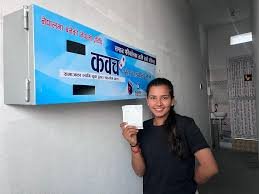In Nepal, menstrual health is more than a biological issue—it's deeply tied to cultural beliefs, education, and access to basic health resources. Despite significant progress in recent years, many young girls and women still face barriers when managing their periods with dignity and safety.
This blog explores Nepal's current menstrual health landscape and how innovations like the Kawach Sanitary Pad Vending Machine are starting to create real change.
Understanding Menstrual Health in Nepal
Menstruation is a natural process, yet in many parts of Nepal, it is still surrounded by myths, taboos, and restrictions. Especially in rural and underdeveloped communities, menstruating women are often considered "impure" and face isolation and discrimination.
Key Challenges:
-
Lack of Awareness: Many girls are not taught about menstruation until after menarche, often confusion, fear, and shame.
-
Cultural Taboos: Practices like Chhaupadi, which force women to stay in secluded sheds during their period, persist in some western regions, despite being criminalized in 2017.
-
Limited Access to Sanitary Products: Many women still rely on old cloth, straw, or other unsafe alternatives.
-
Poor WASH Facilities: Schools and public places often lack clean, private toilets and access to water, making it difficult to maintain menstrual hygiene.
-
Economic Constraints: Sanitary pads can be unaffordable for low-income families, leading to health risks from repeated use of unclean materials.
Impact on Education and Daily Life
The result of these challenges is devastating. Many girls miss school during their periods due to discomfort, fear of leakage, or embarrassment. Some even drop out entirely. Women working in informal sectors also face challenges in managing menstruation hygienically at workplaces that lack proper facilities.
Kawach Pad Vending Machines: A Game Changer
One of the recent and promising interventions in menstrual health in Nepal is the installation of Kawach Pad Vending Machines in schools, colleges, and public spaces.
💡 What is the Kawach Vending Machine?
Kawach is a low-cost, eco-friendly sanitary pad brand developed in India, now being introduced in various parts of Nepal through vending machines. These machines dispense sanitary pads for free or at a minimal cost and are often paired with incinerators for safe disposal.
Impact on Menstrual Health:
-
Increased Access: Girls and women can now access sanitary pads instantly and discreetly, even in emergencies.
-
Reduced School Absenteeism: In schools where vending machines are installed, attendance among girls during menstruation has improved significantly.
-
Improved Hygiene: Promotes the use of safe and clean sanitary products over unhygienic alternatives.
-
Breaks the Stigma: Having menstrual products openly available encourages open conversations and normalizes periods in public and institutional spaces.
-
Sustainable Disposal: Paired with small incinerators, it provides a safe and eco-friendly way to dispose of used pads.
Moving Forward: What Needs to Be Done?
While the introduction of vending machines like Kawach is a step in the right direction, more work is needed to improve menstrual health across Nepal.
Key Areas of Focus:
-
Menstrual Education in schools for both boys and girls.
-
Government-backed initiatives for free or subsidized menstrual products.
-
More vending machines in schools, bus stations, offices, and rural health posts.
-
Better WASH infrastructure—clean toilets, running water, and soap.
-
Community awareness programs to break myths and taboos.
Final Thoughts
Menstruation should never be a reason for shame, fear, or missed opportunities. With continued advocacy, education, and smart innovations like Kawach Pad Vending Machines, Nepal can build a future where every girl and woman can manage her period with dignity, safety, and pride.
Let’s continue to support initiatives that make menstrual health a human right, not a hidden struggle.
